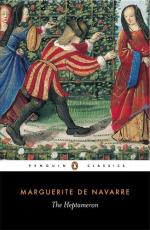But when the gentleman recognised her with both eye and ear, and found he was not with her for whose sake he had so greatly suffered, the love that had made him get so quickly into the bed, made him rise from it still more quickly. And in anger equally with mistress and damsel, he said—
“Neither your folly nor the malice of her who put you there can make me other than I am. But do you try to be an honest woman, for you shall never lose that good name through me.”
So saying he rushed out of the room in the greatest wrath imaginable, and it was long before he returned to see his mistress. However love, which is never without hope, assured him that the greater and more manifest his constancy was proved to be by all these trials, the longer and more delightful would be his bliss.
The lady, who had seen and heard all that passed, was so delighted and amazed at beholding the depth and constancy of his love, that she was impatient to see him again in order to ask his forgiveness for the sorrow that she had caused him to endure. And as soon as she could meet with him, she failed not to address him in such excellent and pleasant words, that he not only forgot all his troubles but even deemed them very fortunate, seeing that their issue was to the glory of his constancy and the perfect assurance of his love, the fruit of which he enjoyed from that time forth as fully as he could desire, without either hindrance or vexation. (3)
3 In reference to this story, Montaigne says in his Essay on Cruelty: “Such as have sensuality to encounter, willingly make use of this argument, that when it is at the height it subjects us to that degree that a man’s reason can have no access... wherein they conceive that the pleasure doth so transport us that our reason cannot perform its office whilst we are so benumbed and extacied in delight.... But I know that a man may triumph over the utmost effort of this pleasure: I have experienced it in myself, and have not found Venus so imperious a goddess as many—and some more reformed than I—declare. I do not consider it as a miracle, as the Queen of Navarre does in one of the Tales of her Heptameron (which is a marvellous pretty book of the kind), nor for a thing of extreme difficulty to pass over whole nights, where a man has all the convenience and liberty he can desire, with a long-coveted mistress, and yet be just to his faith first given to satisfy himself with kisses and innocent embraces only, without pressing any further.”—Cotton’s “Montaigne’s Essays”, London, 1743, vol ii. pp. 109-10.
“I pray you, ladies, find me if you can a woman who has ever shown herself as constant, patient and true as was this man. They who have experienced the like temptations deem those in the pictures of Saint Antony very small in comparison; for one who can remain chaste and patient in spite of beauty, love, opportunity and leisure, will have virtue enough to vanquish every devil.”




